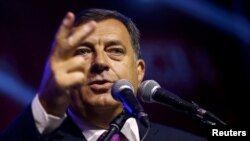Bosnian Serb leader summoned over referendum
| Publisher | Radio Free Europe/Radio Liberty |
| Publication Date | 26 September 2016 |
| Cite as | Radio Free Europe/Radio Liberty, Bosnian Serb leader summoned over referendum, 26 September 2016, available at: https://www.refworld.org/docid/58189e077.html [accessed 19 May 2023] |
| Disclaimer | This is not a UNHCR publication. UNHCR is not responsible for, nor does it necessarily endorse, its content. Any views expressed are solely those of the author or publisher and do not necessarily reflect those of UNHCR, the United Nations or its Member States. |
September 26, 2016
 Milorad Dodik, president of Republika Srpska, speaks after a referendum over a disputed national holiday during an election rally in Pale on September 25.
Milorad Dodik, president of Republika Srpska, speaks after a referendum over a disputed national holiday during an election rally in Pale on September 25.
The head of Bosnia-Herzegovina's autonomous Bosnian Serb entity has been summoned by state prosecutors after he defied a high-court ruling from Sarajevo by holding a controversial referendum.
Republika Srpska's nationalist President Milorad Dodik was summoned after Bosnian Serbs on September 25 voted overwhelmingly to maintain a "statehood day" holiday on January 9.
Prosecutors said Dodik was summoned for a hearing by the prosecutor's office as a suspect in the case. No date was given for the hearing.
Dodik played down the threat of prosecution and said it was politically motivated.
"It is impossible to expect someone to build a state based on arresting political opponents," he said. "The referendum will remain an undisputed fact and it does not matter if Milorad Dodik is held responsible or not."
The U S. State Department condemned the referendum as "illegal" and said it would support local institutions as they sought to hold the Bosnian Serb leadership accountable for undermining the rule of law.
The U.S. Embassy in Sarajevo said it supported the prosecutor's move and warned that the referendum would lead the Republika Srpska to "isolation and uncertainty."
Bosnia's Constitutional Court had canceled the referendum, ruling that the holiday is illegal because it discriminates against non-Serbs, but Dodik held the referendum despite that ruling as well as considerable pressure from the United States and the European Union.
A violation of Constitutional Court decisions is punishable with prison sentences from six months to five years.
"Acting in disregard of a decision of the Constitutional Court blatantly violates the rule of law, and we count on competent institutions to address that violation in accordance with the laws of [Bosnia], while we evaluate appropriate consequences," the U.S. Embassy said.
Western powers fear the vote could bring about instability in Bosnia, which only last week made its first major step toward joining the European Union.
The Bosnian conflict was ignited by Serbs' declaration on January 9, 1992, of an independent "Serb Republic" in the north and east of Bosnia. The territory became the autonomous region of the same name, Republika Srpska, under the Dayton peace agreement which ended the war.
This week's referendum has led to the most heated debate between Bosnian Muslim and Bosnian Serb officials since that pact was signed in 1995.
Most Bosniaks and Croats opposed the referendum out of fear that the Bosnian Serbs could be preparing to secede, destroying the delicate federal structure put in place after the war.
The U.S. Embassy warned that the current political structure established by the Dayton agreement "cannot be challenged without consequences."
With reporting by Reuters and AFP
Link to original story on RFE/RL website
